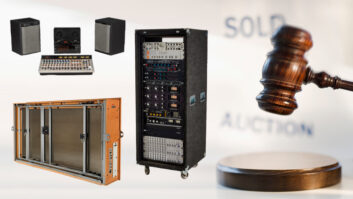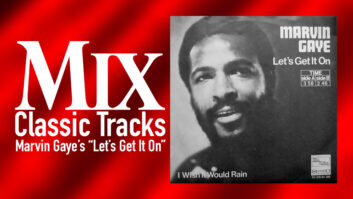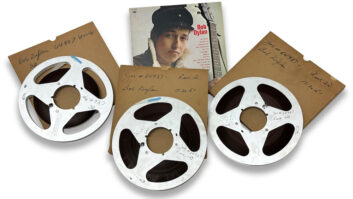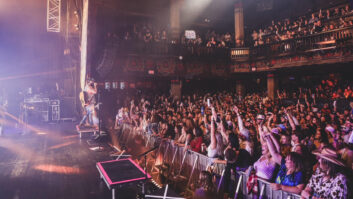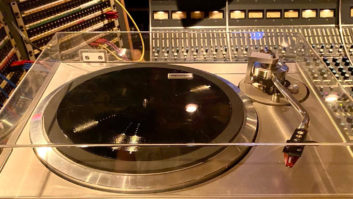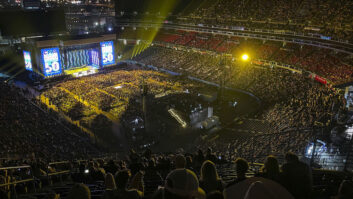
George Wein, founder of the Newport Folk Festival and chairman of the Newport Festival Foundation, with the infamous ‘Dylan Goes Electric’ guitar.
It’s the guitar that shook the folk music world—Bob Dylan’s famous Fender Stratocaster, which he used at the 1965 Newport Folk Festival when he ‘went electric’—and now it’s up for auction.
Estimated at $300,000 to $500,000, this guitar was in the possession of a New Jersey family for nearly 50 years after Dylan left the guitar on a private plane, flown by the family’s father, Vic Quinto. A collection of lyrics, including early drafts of “Absolutely Sweet Marie,” “Medicine Sunday,” “Jet Pilot” and “I Wanna Be Your Lover,” was also left on the plane. After trying to return the items to Dylan’s manager, Albert Grossman, Quinto held onto the guitar and lyrics until 2011, when his daughter, Dawn Peterson, brought the guitar onto the PBS show History Detectives, where it was authenticated.
Christie’s is commissioned for the auction of this important musical artifact, and will hold an auction on December 6, 2013, in New York City. Prior to the event, the auction house held a press preview and welcomed George Wein, founder of the Newport Folk Festival and chairman of the Newport Festival Foundation, to speak about that historical day and how the crowd reacted to Dylan’s electric sound.
The moment Bob Dylan ‘went electric’ occurred on July 25, 1965 at the Newport Folk Festival in Newport, RI, and is one of the most written-about events in modern concert history, as it marked a major change in folk music, paving the way for folk artists to merge rock into their music. But Dylan’s pivotal moment wasn’t exactly welcomed. According to Wein, many of the folk music artists and fans rejected the electric rock sound that was starting to appear in popular music at the time.
“There was a big group of young people who denied this electric sound,” Wein said, specifying that the Beatles were taking over popular music at the time. “Artists like Joan Baez and Bob Dylan rejected this sound. So when Dylan went electric, he surprised everybody.”
Wein said depending on who you talk to, the audience either loved or hated Dylan’s electric performance. “Pro-rockers will say the audience loved it, while pro-acoustics will say the opposite,” Wein said.
Dylan’s choice to play electric was a surprise for everyone too, including Wein, who was producer of the festival that year. “When Dylan was setting up, we didn’t know what he was going to do,” Wein said. “He had an electric guitar, but we weren’t sure if he would use it. The thing was, our sound system was not set up for that type of music.”
After Dylan finished his set, Wein told Dylan he had to go back out and play an acoustic number to appease the booing fans. “I said ‘Bob, you have to sing an acoustic song.’ He said he didn’t have a guitar, and when I asked those backstage if they had a guitar Bob could use, instantly there were 30 guitars in the air,” Wein said.
This moment in music history has been dramatized throughout the years through numerous books and articles, but Wein felt the most important thing of this moment was how it changed folk music: “What we have now is a new folk music that comes out of rock. And it all started with Bob Dylan ‘going electric.’”
